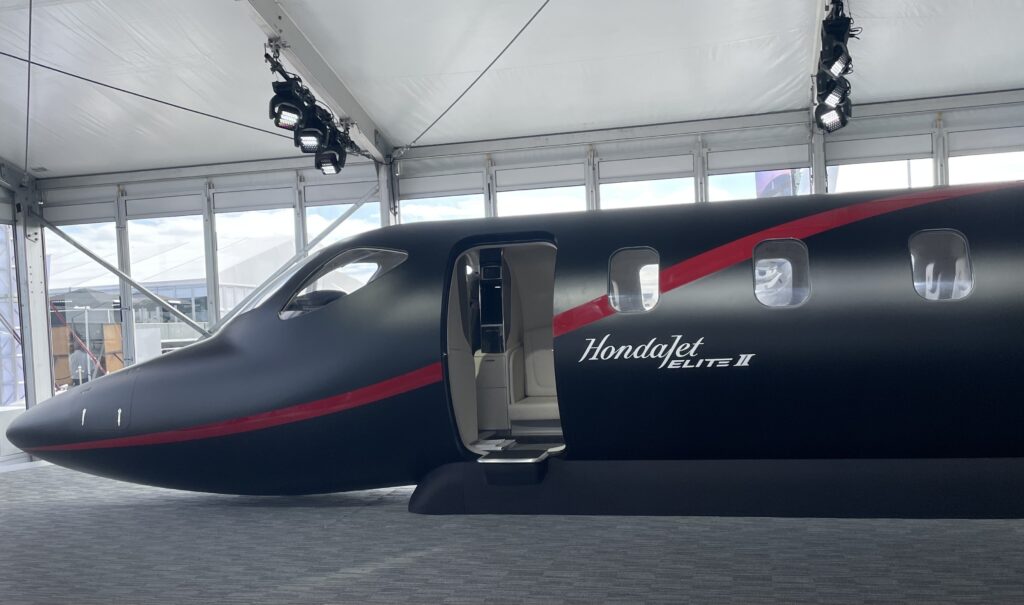
The HondaJet Elite II, pictured above at the NBAA static display in Orlando, received type certification from the FAA last week. (Photo: Jessica Reed)
The HondaJet Elite II aircraft, revealed during the 2022 NBAA Convention and Exhibition in October, just received type certification from the Federal Aviation Administration on November 2.
The Elite II features two key upgrades, stated Kie Nagasawa, Manager, Corporate Communications, in an interview with Avionics International. “Performance-wise, we have more range,” she said. “1,547 nautical miles is the new range, with an extension of roughly 110 nautical miles from the S.”
Honda Aircraft Company increased the usable fuel capacity of the Elite II by more than 200 pounds compared to the Elite S. The total usable fuel capacity for the new model is 3,165 pounds.

The cockpit of the HondaJet Elite II (Photo: Jessica Reed)
The aircraft received an upgrade to the interior as well as a nose-to-tail acoustic treatment, Nagasawa noted. “The Elite II has two new upgrades for avionics: Autothrottle, which will come in the first half of 2023, and Emergency Autoland in the second half,” she said.
The Garmin G3000 offers intuitive controls for the HondaJet Elite II. Nagasawa added that many customers for these aircraft are owner-pilots, but they are seeing growing demand from fleet customers.
Mike Murphy, Sales Director, Fleet & Mid-Atlantic, told Avionics that the Elite II model features an increased maximum take-off weight of 11,100 pounds. The practical capabilities of the aircraft include a range of about 1,100 nautical miles with four passengers and two pilots, he said.
“1,100 nautical miles covers New York to Miami and Miami to New York, the most popular private jet route on the planet,” he remarked.
The G3000 is the “gold standard” for avionics in these types of aircraft, Murphy explained. “There are three main screens. Unique add-ons with the Elite II are faster processors and better acuity.”
He added that having Garmin Emergency Autoland functionality in 2023 will be a huge milestone, especially for single-pilot operations. The Elite II would be the first multi-engine turbine jet in the world with the capacity to perform an autonomous landing in an emergency, he claimed.
“The Autoland activates in an emergency situation to autonomously control and land the aircraft without human intervention,” Murphy explained. “Coupled with the integration of more automated technologies, the HondaJet Elite II offers more confident piloting, enhances operational safety, and reduces pilot workload for more efficient operations.”

(Photos: Jessica Reed)
In designing the Elite II, the Honda Aircraft Company team incorporated a lot of customer feedback. For the upgrade to the interior of the aircraft, it was made to be more refined and a bit more utilitarian, with Onyx and Steel as the two color options for the interior.
Tim Fagan, Head of Cabin Design and Engineering, shared with Avionics that they did some reinforcing and added insulation around the main entry door to reduce wind noise. “We’ve taken a couple of decibels out of the cabin noise, which is already very quiet,” he noted.
“We’ve also increased the design weight of the aircraft by 200 pounds,” Fagan added, which includes the maximum ramp weight, take-off and landing weights, and maximum zero fuel weight. The higher design weight allows the aircraft to carry more fuel at the same payload, compared to the Elite S, and to carry more payload with the same amount of fuel, he explained.